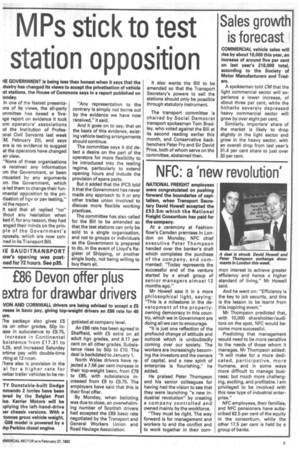NFC: a 'new revolution'
Page 3

If you've noticed an error in this article please click here to report it so we can fix it.
NATIONAL FREIGHT employees were congratulated on pushing forward the boundaries of capitalism, when Transport Secretary David Howell accepted the E53.5m which the National Freight Consortium has paid for the company.
At a ceremony at Fashionflow's Camden premises in London on Monday, NFC chief executive Peter Thompson handed over the banker's draft which completes the purchase of the company, and commented: "Today represents the successful end of the venture started by a small group of senior managers almost 12 months ago."
Mr Howell saw it in a more philosophical light, saying: "This is a milestone in the development of the propertyowning democracy in this country, which we in Government are doing all we can to encourage.
"It is just one reflection of the profound change of attitude and outlook which is undoubtedly coming over our society. The workers are increasingly becoming the investors and the owners of capital, and a new spirit of enterprise is flourishing," he added.
He praised Peter Thompson and his senior colleagues for having had the vision to see that they were launching "a new industrial revolution" by creating a company controlled and owned mainly by the workforce.
"They must be right. The way forward is for management and workers to end the conflict and to work together in their corn mon interest to achieve greater efficiency and hence a higher standard of living," Mr Howell said.
And he went on: "Efficiency is the key to job security, and this is the lesson to be learnt from this inspiring event."
Mr Thompson predicted that, with 10,000 shareholder/auditors on the spot, NFC would become more successful.
Predicting that management would need to be more sensitive to the needs of those whom it manages, Mr Thompson added: "It will make for a more dedicated, participative, more humane, and in some ways more difficult to manage business; but much more challenging, exciting, and profitable. I am privileged to be involved with this new type of industrial enterprise."
NFC employees, their families, and NFC pensioners have subscribed 82.5 per cent of the equity in the consortium, while the other 17.5 per cent is held by a group of banks.


















































